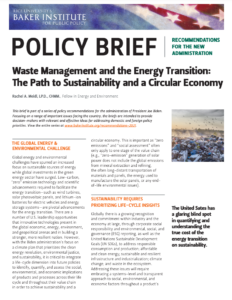Full Title: Waste Management and the Energy Transition: The Path to Sustainability and a Circular Economy
Author(s): Rachel A. Meidl
Publisher(s): Rice University's Baker Institute for Public Policy
Publication Date: February 19, 2021
Full Text: Download Resource
Description (excerpt):
Integrating a life-cycle dimension into future policies to assess the social, environmental and economic implications of various products across their life cycle and throughout their value chain is critical to achieving sustainability and a circular economy, writes Rachel A. Meidl, fellow in energy and environment.
Global energy and environmental challenges have spurred an increased focus on sustainable sources of energy while global investments in the green energy sector have surged. Low-carbon, “zero” emission technology and scientific advancements required to facilitate the energy transition—such as wind turbines, solar photovoltaic panels, and lithium-ion batteries for electric vehicles and energy storage systems—are pivotal advancements for the energy transition. There are a number of U.S. leadership opportunities that innovative technologies present in the global economic, energy, environment, and geopolitical arenas and in building a stronger, more resilient nation. However, with the Biden administration’s focus on a climate plan that prioritizes the clean energy revolution, environmental justice, and sustainability, it is critical to integrate a life-cycle dimension into future policies to identify, quantify, and assess the social, environmental, and economic implications of products and processes across their life cycle and throughout their value chain in order to achieve sustainability and a circular economy. This is important as “zero emissions” and “social assessment” often only apply to one stage of the value chain (e.g., “zero-emission” generation of solar power does not include the global emissions from mineral extraction and refining, the often long-distant transportation of materials and panels, the energy used to manufacture the solar panels, or any end-of-life environmental issues).
